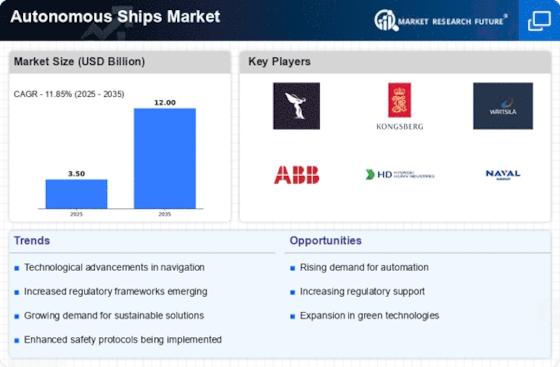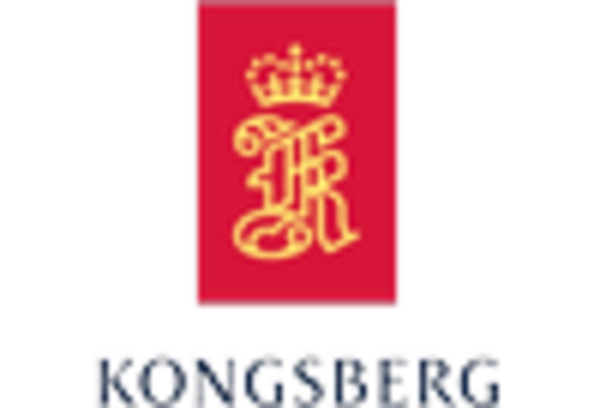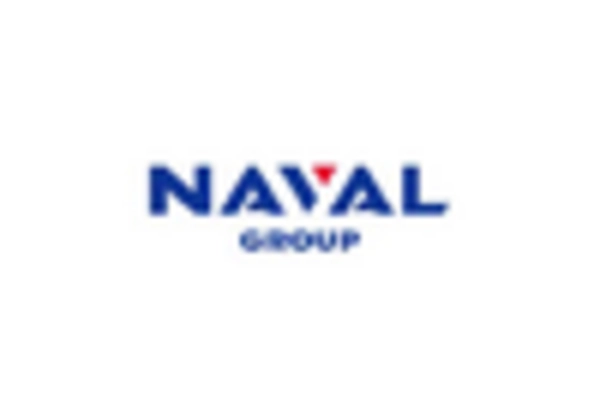Cargo Ships
Tankers
Passenger Ships
Fishing Vessels
Remote Controlled
Fully Autonomous
Semi-Autonomous
Commercial Shipping
Defence
Research and Exploration
GPS Based Systems
Lidar Systems
Radar Systems
North America
Europe
South America
Asia Pacific
Middle East and Africa
North America Outlook (USD Billion, 2019-2035)
North America Autonomous Ships Market by Vessel Type
Cargo Ships
Tankers
Passenger Ships
Fishing Vessels
North America Autonomous Ships Market by Technology Type
Remote Controlled
Fully Autonomous
Semi-Autonomous
North America Autonomous Ships Market by End Use Type
Commercial Shipping
Defence
Research and Exploration
North America Autonomous Ships Market by Navigation System Type
GPS Based Systems
Lidar Systems
Radar Systems
North America Autonomous Ships Market by Regional Type
US
Canada
US Outlook (USD Billion, 2019-2035)
US Autonomous Ships Market by Vessel Type
Cargo Ships
Tankers
Passenger Ships
Fishing Vessels
US Autonomous Ships Market by Technology Type
Remote Controlled
Fully Autonomous
Semi-Autonomous
US Autonomous Ships Market by End Use Type
Commercial Shipping
Defence
Research and Exploration
US Autonomous Ships Market by Navigation System Type
GPS Based Systems
Lidar Systems
Radar Systems
CANADA Outlook (USD Billion, 2019-2035)
CANADA Autonomous Ships Market by Vessel Type
Cargo Ships
Tankers
Passenger Ships
Fishing Vessels
CANADA Autonomous Ships Market by Technology Type
Remote Controlled
Fully Autonomous
Semi-Autonomous
CANADA Autonomous Ships Market by End Use Type
Commercial Shipping
Defence
Research and Exploration
CANADA Autonomous Ships Market by Navigation System Type
GPS Based Systems
Lidar Systems
Radar Systems
Europe Outlook (USD Billion, 2019-2035)
Europe Autonomous Ships Market by Vessel Type
Cargo Ships
Tankers
Passenger Ships
Fishing Vessels
Europe Autonomous Ships Market by Technology Type
Remote Controlled
Fully Autonomous
Semi-Autonomous
Europe Autonomous Ships Market by End Use Type
Commercial Shipping
Defence
Research and Exploration
Europe Autonomous Ships Market by Navigation System Type
GPS Based Systems
Lidar Systems
Radar Systems
Europe Autonomous Ships Market by Regional Type
Germany
UK
France
Russia
Italy
Spain
Rest of Europe
GERMANY Outlook (USD Billion, 2019-2035)
GERMANY Autonomous Ships Market by Vessel Type
Cargo Ships
Tankers
Passenger Ships
Fishing Vessels
GERMANY Autonomous Ships Market by Technology Type
Remote Controlled
Fully Autonomous
Semi-Autonomous
GERMANY Autonomous Ships Market by End Use Type
Commercial Shipping
Defence
Research and Exploration
GERMANY Autonomous Ships Market by Navigation System Type
GPS Based Systems
Lidar Systems
Radar Systems
UK Outlook (USD Billion, 2019-2035)
UK Autonomous Ships Market by Vessel Type
Cargo Ships
Tankers
Passenger Ships
Fishing Vessels
UK Autonomous Ships Market by Technology Type
Remote Controlled
Fully Autonomous
Semi-Autonomous
UK Autonomous Ships Market by End Use Type
Commercial Shipping
Defence
Research and Exploration
UK Autonomous Ships Market by Navigation System Type
GPS Based Systems
Lidar Systems
Radar Systems
FRANCE Outlook (USD Billion, 2019-2035)
FRANCE Autonomous Ships Market by Vessel Type
Cargo Ships
Tankers
Passenger Ships
Fishing Vessels
FRANCE Autonomous Ships Market by Technology Type
Remote Controlled
Fully Autonomous
Semi-Autonomous
FRANCE Autonomous Ships Market by End Use Type
Commercial Shipping
Defence
Research and Exploration
FRANCE Autonomous Ships Market by Navigation System Type
GPS Based Systems
Lidar Systems
Radar Systems
RUSSIA Outlook (USD Billion, 2019-2035)
RUSSIA Autonomous Ships Market by Vessel Type
Cargo Ships
Tankers
Passenger Ships
Fishing Vessels
RUSSIA Autonomous Ships Market by Technology Type
Remote Controlled
Fully Autonomous
Semi-Autonomous
RUSSIA Autonomous Ships Market by End Use Type
Commercial Shipping
Defence
Research and Exploration
RUSSIA Autonomous Ships Market by Navigation System Type
GPS Based Systems
Lidar Systems
Radar Systems
ITALY Outlook (USD Billion, 2019-2035)
ITALY Autonomous Ships Market by Vessel Type
Cargo Ships
Tankers
Passenger Ships
Fishing Vessels
ITALY Autonomous Ships Market by Technology Type
Remote Controlled
Fully Autonomous
Semi-Autonomous
ITALY Autonomous Ships Market by End Use Type
Commercial Shipping
Defence
Research and Exploration
ITALY Autonomous Ships Market by Navigation System Type
GPS Based Systems
Lidar Systems
Radar Systems
SPAIN Outlook (USD Billion, 2019-2035)
SPAIN Autonomous Ships Market by Vessel Type
Cargo Ships
Tankers
Passenger Ships
Fishing Vessels
SPAIN Autonomous Ships Market by Technology Type
Remote Controlled
Fully Autonomous
Semi-Autonomous
SPAIN Autonomous Ships Market by End Use Type
Commercial Shipping
Defence
Research and Exploration
SPAIN Autonomous Ships Market by Navigation System Type
GPS Based Systems
Lidar Systems
Radar Systems
REST OF EUROPE Outlook (USD Billion, 2019-2035)
REST OF EUROPE Autonomous Ships Market by Vessel Type
Cargo Ships
Tankers
Passenger Ships
Fishing Vessels
REST OF EUROPE Autonomous Ships Market by Technology Type
Remote Controlled
Fully Autonomous
Semi-Autonomous
REST OF EUROPE Autonomous Ships Market by End Use Type
Commercial Shipping
Defence
Research and Exploration
REST OF EUROPE Autonomous Ships Market by Navigation System Type
GPS Based Systems
Lidar Systems
Radar Systems
APAC Outlook (USD Billion, 2019-2035)
APAC Autonomous Ships Market by Vessel Type
Cargo Ships
Tankers
Passenger Ships
Fishing Vessels
APAC Autonomous Ships Market by Technology Type
Remote Controlled
Fully Autonomous
Semi-Autonomous
APAC Autonomous Ships Market by End Use Type
Commercial Shipping
Defence
Research and Exploration
APAC Autonomous Ships Market by Navigation System Type
GPS Based Systems
Lidar Systems
Radar Systems
APAC Autonomous Ships Market by Regional Type
China
India
Japan
South Korea
Malaysia
Thailand
Indonesia
Rest of APAC
CHINA Outlook (USD Billion, 2019-2035)
CHINA Autonomous Ships Market by Vessel Type
Cargo Ships
Tankers
Passenger Ships
Fishing Vessels
CHINA Autonomous Ships Market by Technology Type
Remote Controlled
Fully Autonomous
Semi-Autonomous
CHINA Autonomous Ships Market by End Use Type
Commercial Shipping
Defence
Research and Exploration
CHINA Autonomous Ships Market by Navigation System Type
GPS Based Systems
Lidar Systems
Radar Systems
INDIA Outlook (USD Billion, 2019-2035)
INDIA Autonomous Ships Market by Vessel Type
Cargo Ships
Tankers
Passenger Ships
Fishing Vessels
INDIA Autonomous Ships Market by Technology Type
Remote Controlled
Fully Autonomous
Semi-Autonomous
INDIA Autonomous Ships Market by End Use Type
Commercial Shipping
Defence
Research and Exploration
INDIA Autonomous Ships Market by Navigation System Type
GPS Based Systems
Lidar Systems
Radar Systems
JAPAN Outlook (USD Billion, 2019-2035)
JAPAN Autonomous Ships Market by Vessel Type
Cargo Ships
Tankers
Passenger Ships
Fishing Vessels
JAPAN Autonomous Ships Market by Technology Type
Remote Controlled
Fully Autonomous
Semi-Autonomous
JAPAN Autonomous Ships Market by End Use Type
Commercial Shipping
Defence
Research and Exploration
JAPAN Autonomous Ships Market by Navigation System Type
GPS Based Systems
Lidar Systems
Radar Systems
SOUTH KOREA Outlook (USD Billion, 2019-2035)
SOUTH KOREA Autonomous Ships Market by Vessel Type
Cargo Ships
Tankers
Passenger Ships
Fishing Vessels
SOUTH KOREA Autonomous Ships Market by Technology Type
Remote Controlled
Fully Autonomous
Semi-Autonomous
SOUTH KOREA Autonomous Ships Market by End Use Type
Commercial Shipping
Defence
Research and Exploration
SOUTH KOREA Autonomous Ships Market by Navigation System Type
GPS Based Systems
Lidar Systems
Radar Systems
MALAYSIA Outlook (USD Billion, 2019-2035)
MALAYSIA Autonomous Ships Market by Vessel Type
Cargo Ships
Tankers
Passenger Ships
Fishing Vessels
MALAYSIA Autonomous Ships Market by Technology Type
Remote Controlled
Fully Autonomous
Semi-Autonomous
MALAYSIA Autonomous Ships Market by End Use Type
Commercial Shipping
Defence
Research and Exploration
MALAYSIA Autonomous Ships Market by Navigation System Type
GPS Based Systems
Lidar Systems
Radar Systems
THAILAND Outlook (USD Billion, 2019-2035)
THAILAND Autonomous Ships Market by Vessel Type
Cargo Ships
Tankers
Passenger Ships
Fishing Vessels
THAILAND Autonomous Ships Market by Technology Type
Remote Controlled
Fully Autonomous
Semi-Autonomous
THAILAND Autonomous Ships Market by End Use Type
Commercial Shipping
Defence
Research and Exploration
THAILAND Autonomous Ships Market by Navigation System Type
GPS Based Systems
Lidar Systems
Radar Systems
INDONESIA Outlook (USD Billion, 2019-2035)
INDONESIA Autonomous Ships Market by Vessel Type
Cargo Ships
Tankers
Passenger Ships
Fishing Vessels
INDONESIA Autonomous Ships Market by Technology Type
Remote Controlled
Fully Autonomous
Semi-Autonomous
INDONESIA Autonomous Ships Market by End Use Type
Commercial Shipping
Defence
Research and Exploration
INDONESIA Autonomous Ships Market by Navigation System Type
GPS Based Systems
Lidar Systems
Radar Systems
REST OF APAC Outlook (USD Billion, 2019-2035)
REST OF APAC Autonomous Ships Market by Vessel Type
Cargo Ships
Tankers
Passenger Ships
Fishing Vessels
REST OF APAC Autonomous Ships Market by Technology Type
Remote Controlled
Fully Autonomous
Semi-Autonomous
REST OF APAC Autonomous Ships Market by End Use Type
Commercial Shipping
Defence
Research and Exploration
REST OF APAC Autonomous Ships Market by Navigation System Type
GPS Based Systems
Lidar Systems
Radar Systems
South America Outlook (USD Billion, 2019-2035)
South America Autonomous Ships Market by Vessel Type
Cargo Ships
Tankers
Passenger Ships
Fishing Vessels
South America Autonomous Ships Market by Technology Type
Remote Controlled
Fully Autonomous
Semi-Autonomous
South America Autonomous Ships Market by End Use Type
Commercial Shipping
Defence
Research and Exploration
South America Autonomous Ships Market by Navigation System Type
GPS Based Systems
Lidar Systems
Radar Systems
South America Autonomous Ships Market by Regional Type
Brazil
Mexico
Argentina
Rest of South America
BRAZIL Outlook (USD Billion, 2019-2035)
BRAZIL Autonomous Ships Market by Vessel Type
Cargo Ships
Tankers
Passenger Ships
Fishing Vessels
BRAZIL Autonomous Ships Market by Technology Type
Remote Controlled
Fully Autonomous
Semi-Autonomous
BRAZIL Autonomous Ships Market by End Use Type
Commercial Shipping
Defence
Research and Exploration
BRAZIL Autonomous Ships Market by Navigation System Type
GPS Based Systems
Lidar Systems
Radar Systems
MEXICO Outlook (USD Billion, 2019-2035)
MEXICO Autonomous Ships Market by Vessel Type
Cargo Ships
Tankers
Passenger Ships
Fishing Vessels
MEXICO Autonomous Ships Market by Technology Type
Remote Controlled
Fully Autonomous
Semi-Autonomous
MEXICO Autonomous Ships Market by End Use Type
Commercial Shipping
Defence
Research and Exploration
MEXICO Autonomous Ships Market by Navigation System Type
GPS Based Systems
Lidar Systems
Radar Systems
ARGENTINA Outlook (USD Billion, 2019-2035)
ARGENTINA Autonomous Ships Market by Vessel Type
Cargo Ships
Tankers
Passenger Ships
Fishing Vessels
ARGENTINA Autonomous Ships Market by Technology Type
Remote Controlled
Fully Autonomous
Semi-Autonomous
ARGENTINA Autonomous Ships Market by End Use Type
Commercial Shipping
Defence
Research and Exploration
ARGENTINA Autonomous Ships Market by Navigation System Type
GPS Based Systems
Lidar Systems
Radar Systems
REST OF SOUTH AMERICA Outlook (USD Billion, 2019-2035)
REST OF SOUTH AMERICA Autonomous Ships Market by Vessel Type
Cargo Ships
Tankers
Passenger Ships
Fishing Vessels
REST OF SOUTH AMERICA Autonomous Ships Market by Technology Type
Remote Controlled
Fully Autonomous
Semi-Autonomous
REST OF SOUTH AMERICA Autonomous Ships Market by End Use Type
Commercial Shipping
Defence
Research and Exploration
REST OF SOUTH AMERICA Autonomous Ships Market by Navigation System Type
GPS Based Systems
Lidar Systems
Radar Systems
MEA Outlook (USD Billion, 2019-2035)
MEA Autonomous Ships Market by Vessel Type
Cargo Ships
Tankers
Passenger Ships
Fishing Vessels
MEA Autonomous Ships Market by Technology Type
Remote Controlled
Fully Autonomous
Semi-Autonomous
MEA Autonomous Ships Market by End Use Type
Commercial Shipping
Defence
Research and Exploration
MEA Autonomous Ships Market by Navigation System Type
GPS Based Systems
Lidar Systems
Radar Systems
MEA Autonomous Ships Market by Regional Type
GCC Countries
South Africa
Rest of MEA
GCC COUNTRIES Outlook (USD Billion, 2019-2035)
GCC COUNTRIES Autonomous Ships Market by Vessel Type
Cargo Ships
Tankers
Passenger Ships
Fishing Vessels
GCC COUNTRIES Autonomous Ships Market by Technology Type
Remote Controlled
Fully Autonomous
Semi-Autonomous
GCC COUNTRIES Autonomous Ships Market by End Use Type
Commercial Shipping
Defence
Research and Exploration
GCC COUNTRIES Autonomous Ships Market by Navigation System Type
GPS Based Systems
Lidar Systems
Radar Systems
SOUTH AFRICA Outlook (USD Billion, 2019-2035)
SOUTH AFRICA Autonomous Ships Market by Vessel Type
Cargo Ships
Tankers
Passenger Ships
Fishing Vessels
SOUTH AFRICA Autonomous Ships Market by Technology Type
Remote Controlled
Fully Autonomous
Semi-Autonomous
SOUTH AFRICA Autonomous Ships Market by End Use Type
Commercial Shipping
Defence
Research and Exploration
SOUTH AFRICA Autonomous Ships Market by Navigation System Type
GPS Based Systems
Lidar Systems
Radar Systems
REST OF MEA Outlook (USD Billion, 2019-2035)
REST OF MEA Autonomous Ships Market by Vessel Type
Cargo Ships
Tankers
Passenger Ships
Fishing Vessels
REST OF MEA Autonomous Ships Market by Technology Type
Remote Controlled
Fully Autonomous
Semi-Autonomous
REST OF MEA Autonomous Ships Market by End Use Type
Commercial Shipping
Defence
Research and Exploration
REST OF MEA Autonomous Ships Market by Navigation System Type
GPS Based Systems
Lidar Systems
Radar Systems


















Leave a Comment